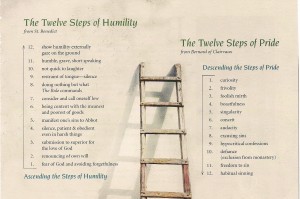
Chapter 7 of Benedict’s Rule of Life is about “Humility” as introduced in the previous entry. Here we will consider each of the 12 steps of the Ladder of Humility.
- The first step of humility is that a man keeps the fear of God always before his eyes and never forgets it.
- The second step of humility is that a man loves not his own will nor takes pleasure in the satisfaction of his desires; rather he shall imitate by his actions that saying of the Lord, “I have come not to do my own will, but the will of him who sent me.”
- The third step of humility is that a man submits to his superior in all obedience for the love of God, imitating the Lord, of whom the Apostle says, “He became obedient even to death.”
- The fourth step of humility is that in this obedience under difficult, unfavorable, or even unjust conditions, his heart quietly embraces suffering and endures it without weakening or seeking escape.
- The fifth step of humility is that a man does not conceal from his abbot any sinful thoughts entering his heart, or any wrongs committed in secret, but rather confesses them humbly.
- The sixth step of humility is that a monk is content with the lowest and most menial treatment, and regards himself as a poor and worthless workman in whatever task he is given.
- The seventh step of humility is that a man only admits with his tongue but is also convinced in his heart that he is inferior to all and of less value, humbling himself in order to learn God’s commandments.
- The eighth step of humility is that a monk does only what is endorsed by the common rule of the monastery and the example set by his superiors.
- The ninth step of humility is that a monk controls his tongue and remains silent, not speaking unless asked a question, for ‘in a flood of words you will not avoid sinning.’
- The tenth step of humility is that he is not given to ready laughter, for it is written, ‘only a fool raises his voice in laughter.’
- The eleventh step of humility is that a monk speaks gently and without laughter, seriously and with becoming modesty, briefly and reasonably, but without raising his voice, as it is written, ‘A wise man is known by his few words.’
- The twelfth step of humility is that a monk always manifests humility in his bearing no less than in his heart, so that it is evident at the Work of God, in the oratory, the monastery or the garden, on a journey or in the field, or anywhere else.
For Benedict, ascending all these steps of humility is how the person arrives at the doorstep of perfect love of God, which casts out all fear. What may start out being lives of love performed out of dread, will now become more naturally lives filled with the expressions of good habit and delight in virtue – all out of love for Christ. “All this the Lord will by the Holy Spirit graciously manifest in his workman now cleansed of vices and sins.”
Imagine for a moment if each of your words, attitudes, actions, and interactions were a reflection of the humility of Christ, expressed through you and for God’s glory. What would be your most dramatic impressions of loving humility shared possibly for the very first time?
Consider crafting your own rule of life and join the community of other like hearts and minds at www.RuleOfLife.com




